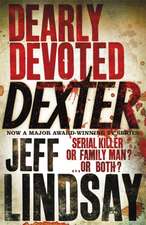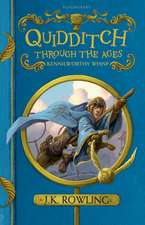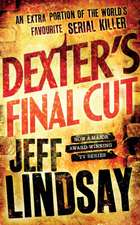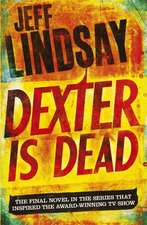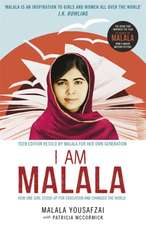Darkly Dreaming Dexter: Die Dexter-Reihe
Autor Jeff Lindsayen Limba Engleză Paperback – 27 iul 2005
| Toate formatele și edițiile | Preț | Express |
|---|---|---|
| Paperback (2) | 70.04 lei 3-5 săpt. | +10.62 lei 7-13 zile |
| Orion Publishing Group – 27 iul 2005 | 70.04 lei 3-5 săpt. | +10.62 lei 7-13 zile |
| Vintage Books USA – 31 aug 2006 | 96.52 lei 3-5 săpt. |
Preț: 70.04 lei
Nou
13.41€ • 13.94$ • 11.22£
Carte disponibilă
Livrare economică 21 februarie-07 martie
Livrare express 07-13 februarie pentru 20.61 lei
Specificații
ISBN-10: 0752865749
Pagini: 275
Dimensiuni: 128 x 196 x 25 mm
Greutate: 0.26 kg
Ediția:New edition
Editura: Orion Publishing Group
Colecția Orion
Seria Die Dexter-Reihe
Locul publicării:London, United Kingdom
Notă biografică
Jeff Lindsay is the author of four previous novels and several plays. As well as writing, he is a world-champion at karate and plays with a band. Jeff lives in Florida with his wife and three daughters.
Descriere
Dexter Morgan isn't exactly the kind of man you'd bring home to your mum. At heart, he's the perfect gentleman: he has a shy girlfriend, and seems to lead a quiet, normal life bordering on the mundane. Despite the fact that he can't stand the sight of blood, he works as a blood-spatter analyst for the Miami police.
But Dexter also has a secret hobby: he is an accomplished serial killer. So far, he's killed 36 people and has never been caught because he knows exactly how to hide the evidence. And while that may lead some people to assume he's not such a nice guy, he tempers his insatiable hunger for brutality by only killing the bad guys.
However, Dexter's well-organised life is suddenly disrupted when a second, much more visible serial killer appears in Miami. Intrigued that the other killer favours a style similar to his own, Dexter soon realises that the mysterious new arrival is not simply invading his turf but offering him a direct invitation to 'come out and play'...
Extras
Moon. Glorious moon. Full, fat, reddish moon, the night as light as day, the moonlight flooding down across the land and bringing joy, joy, joy. Bringing too the full-throated call of the tropical night, the soft and wild voice of the wind roaring through the hairs on your arm, the hollow wail of starlight, the teeth-grinding bellow of the moonlight off the water.
All calling to the Need. Oh, the symphonic shriek of the thousand hiding voices, the cry of the Need inside, the entity, the silent watcher, the cold quiet thing, the one that laughs, the Moondancer. The me that was not-me, the thing that mocked and laughed and came calling with its hunger. With the Need. And the Need was very strong now, very careful cold coiled creeping crackly cocked and ready, very strong, very much ready now--and still it waited and watched, and it made me wait and watch.
I had been waiting and watching the priest for five weeks now. The Need had been prickling and teasing and prodding at me to find one, find the next, find this priest. For three weeks I had known he was it, he was next, we belonged to the Dark Passenger, he and I together. And that three weeks I had spent fighting the pressure, the growing Need, rising in me like a great wave that roars up and over the beach and does not recede, only swells more with every tick of the bright night's clock.
But it was careful time, too, time spent making sure. Not making sure of the priest, no, I was long sure of him. Time spent to be certain that it could be done right, made neat, all the corners folded, all squared away. I could not be caught, not now. I had worked too hard, too long, to make this work for me, to protect my happy little life.
And I was having too much fun to stop now.
And so I was always careful. Always tidy. Always prepared ahead of time so it would be right. And when it was right, take extra time to be sure. It was the Harry way, God bless him, that farsighted perfect policeman, my foster father. Always be sure, be careful, be exact, he had said, and for a week now I had been sure that everything was just as Harry-right as it could be. And when I left work this night, I knew this was it. This night was the Night. This night felt different. This night it would happen, had to happen. Just as it had happened before. Just as it would happen again, and again.
And tonight it would happen to the priest.
His name was Father Donovan. He taught music to the children at St. Anthony's Orphanage in Homestead, Florida. The children loved him. And of course he loved the children, oh very much indeed. He had devoted a whole life to them. Learned Creole and Spanish. Learned their music, too. All for the kids. Everything he did, it was all for the kids.
Everything.
I watched him this night as I had watched for so many nights now. Watched as he paused in the orphanage doorway to talk to a young black girl who had followed him out. She was small, no more than eight years old and small for that. He sat on the steps and talked to her for five minutes. She sat, too, and bounced up and down. They laughed. She leaned against him. He touched her hair. A nun came out and stood in the doorway, looking down at them for a moment before she spoke. Then she smiled and held out a hand. The girl bumped her head against the priest. Father Donovan hugged her, stood, and kissed the girl good night. The nun laughed and said something to Father Donovan. He said something back.
And then he started toward his car. Finally: I coiled myself to strike and--
Not yet. A janitorial service minivan stood fifteen feet from the door. As Father Donovan passed it, the side door slid open. A man leaned out, puffing on a cigarette, and greeted the priest, who leaned against the van and talked to the man.
Luck. Luck again. Always luck on these Nights. I had not seen the man, not guessed he was there. But he would have seen me. If not for Luck.
I took a deep breath. Let it out slow and steady, icy cold. It was only one small thing. I had not missed any others. I had done it all right, all the same, all the way it had to be done. It would be right.
Now.
Father Donovan walked toward his car again. He turned once and called something. The janitor waved from the doorway to the orphanage, then stubbed out his cigarette and disappeared inside the building. Gone.
Luck. Luck again.
Father Donovan fumbled for his keys, opened his car door, got into his car. I heard the key go in. Heard the engine turn over. And then--
NOW.
I sat up in his backseat and slipped the noose around his neck. One quick, slippery, pretty twist and the coil of fifty-pound-test fishing line settled tight. He made a small ratchet of panic and that was it.
"You are mine now," I told him, and he froze as neat and perfect as if he had practiced, almost like he heard the other voice, the laughing watcher inside me.
"Do exactly as I say," I said.
He rasped half a breath and glanced into his rearview mirror. My face was there, waiting for him, wrapped in the white silk mask that showed only my eyes.
"Do you understand?" I said. The silk of the mask flowed across my lips as I spoke.
Father Donovan said nothing. Stared at my eyes. I pulled on the noose.
"Do you understand?" I repeated, a little softer.
This time he nodded. He fluttered a hand at the noose, not sure what would happen if he tried to loosen it. His face was turning purple.
I loosened the noose for him. "Be good," I said, "and you will live longer."
He took a deep breath. I could hear the air rip at his throat. He coughed and breathed again. But he sat still and did not try to escape.
This was very good.
We drove. Father Donovan followed my directions, no tricks, no hesitations. We drove south through Florida City and took the Card Sound Road. I could tell that road made him nervous, but he did not object. He did not try to speak to me. He kept both hands on the wheel, pale and knotted tight, so the knuckles stood up. That was very good, too.
We drove south for another five minutes with no sound but the song of the tires and the wind and the great moon above making its mighty music in my veins, and the careful watcher laughing quietly in the rush of the night's hard pulse.
"Turn here," I said at last.
The priest's eyes flew to mine in the mirror. The panic was trying to claw out of his eyes, down his face, into his mouth to speak, but--
"Turn!" I said, and he turned. Slumped like he had been expecting this all along, waiting for it forever, and he turned.
The small dirt road was barely visible. You almost had to know it was there. But I knew. I had been there before. The road ran for two and a half miles, twisting three times, through the saw grass, through the trees, alongside a small canal, deep into the swamp and into a clearing.
Fifty years ago somebody had built a house. Most of it was still there. It was large for what it was. Three rooms, half a roof still left, the place completely abandoned now for many years.
Except the old vegetable garden out in the side yard. There were signs that somebody had been digging there fairly recently.
"Stop the car," I said as the headlights picked up the crumbling house.
Father Donovan lurched to obey. Fear had sealed him into his body now, his limbs and thoughts all rigid.
"Turn off the motor," I told him, and he did.
It was suddenly very quiet.
Some small something chittered in a tree. The wind rattled the grass. And then more quiet, silence so deep it almost drowned out the roar of the night music that pounded away in my secret self.
"Get out," I said.
Father Donovan did not move. His eyes were on the vegetable garden.
A few small mounds of earth were visible there. The heaped soil looked very dark in the moonlight. It must have looked even darker to Father Donovan. And still he did not move.
I yanked hard on the noose, harder than he thought he could live through, harder than he knew could happen to him. His back arched against the seat and the veins stood out on his forehead and he thought he was about to die.
But he was not. Not yet. Not for quite some time, in fact.
I kicked the car door open and pulled him out after me, just to let him feel my strength. He flopped to the sandy roadbed and twisted like an injured snake. The Dark Passenger laughed and loved it and I played the part. I put one boot on Father Donovan's chest and held the noose tight.
"You have to listen and do as I say," I told him. "You have to." I bent and gently loosened the noose. "You should know that. It's important," I said.
And he heard me. His eyes, pounding with blood and pain and leaking tears onto his face, his eyes met mine in a rush of understanding and all the things that had to happen were there for him to see now. And he saw. And he knew how important it was for him to be just right. He began to know.
"Get up now," I said.
Slowly, very slowly, with his eyes always on mine, Father Donovan got up. We stood just like that for a long time, our eyes together, becoming one person with one need, and then he trembled. He raised one hand halfway to his face and dropped it again.
"In the house," I said, so very softly. In the house where everything was ready.
Father Donovan dropped his eyes. He raised them to me but could not look anymore. He turned toward the house but stopped as he saw again the dark dirt mounds of the garden. And he wanted to look at me, but he could not, not after seeing again those black moonlit heaps of earth.
He started for the house and I held his leash. He went obediently, head down, a good and docile victim. Up the five battered steps, across the narrow porch to the front door, pushed shut. Father Donovan stopped. He did not look up. He did not look at me.
"Through the door," I said in my soft command voice.
Father Donovan trembled.
"Go through the door now," I said again.
But he could not.
I leaned past him and pushed the door open. I shoved the priest in with my foot. He stumbled, righted himself, and stood just inside, eyes squeezed tight shut.
I closed the door. I had left a battery lamp standing on the floor beside the door and I turned it on.
"Look," I whispered.
Father Donovan slowly, carefully, opened one eye.
He froze.
Time stopped for Father Donovan.
"No," he said.
"Yes," I said.
"Oh, no," he said.
"Oh, yes," I said.
He screamed, "NOOOO!"
I yanked on the noose. His scream was cut off and he fell to his knees. He made a wet croaky whimpering sound and covered his face. "Yes," I said. "It's a terrible mess, isn't it?"
He used his whole face to close his eyes. He could not look, not now, not like this. I did not blame him, not really, it was a terrible mess. It had bothered me just to know it was there since I had set it up for him. But he had to see it. He had to. Not just for me. Not just for the Dark Passenger. For him. He had to see. And he was not looking.
"Open your eyes, Father Donovan," I said.
"Please," he said in a terrible little whimper. It got on my nerves very badly, shouldn't have, icy-clean control, but it got to me, whining in the face of that mess on the floor, and I kicked his legs out from under him. I hauled hard on the noose and grabbed the back of his neck with my right hand, then slammed his face into the filthy warped floorboards. There was a little blood and that made me madder.
"Open them," I said. "Open your eyes. Open them NOW. Look." I grabbed his hair and pulled his head back. "Do as you're told," I said. "Look. Or I will cut your eyelids right off your face."
I was very convincing. And so he did it. He did as he was told. He looked.
I had worked hard to make it right, but you have to use what you've got to work with. I could not have done it at all if they had not been there long enough for everything to dry up, but they were so very dirty. I had managed to clean off most of the dirt, but some of the bodies had been in the garden a very long time and you couldn't tell where the dirt began and the body stopped. You never could tell, really, when you stop to think about it. So dirty--
There were seven of them, seven small bodies, seven extra-dirty orphan children laid out on rubber shower sheets, which are neater and don't leak. Seven straight lines pointing straight across the room.
Pointing right at Father Donovan. So he knew.
He was about to join them.
"Hail Mary, full of grace--" he started. I jerked hard on the noose.
"None of that, Father. Not now. Now is for real truth."
"Please," he choked.
"Yes, beg me. That's good. Much better." I yanked again. "Do you think that's it, Father? Seven bodies? Did they beg?" He had nothing to say. "Do you think that's all of them, Father? Just seven? Did I get them all?"
"Oh, God," he rasped out, with a pain that was good to hear.
"And what about the other towns, Father? What about Fayetteville? Would you like to talk about Fayetteville?" He just choked out a sob, no words. "And what about East Orange? Was that three? Or did I miss one there? It's so hard to be sure. Was it four in East Orange, Father?"
Father Donovan tried to scream. There was not enough left of his throat for it to be a very good scream, but it had real feeling behind it, which made up for the poor technique. Then he fell forward onto his face and I let him snivel for a while before I pulled him up and onto his feet. He was not steady, and not in control. His bladder had let loose and there was drool on his chin.
"Please," he said. "I couldn't help myself. I just couldn't help myself. Please, you have to understand--"
"I do understand, Father," I said, and there was something in my voice, the Dark Passenger's voice now, and the sound of it froze him. He lifted his head slowly to face me and what he saw in my eyes made him very still. "I understand perfectly," I told him, moving very close to his face. The sweat on his cheeks turned to ice. "You see," I said, "I can't help myself either."
From the Hardcover edition.
Recenzii
From the Paperback edition.








